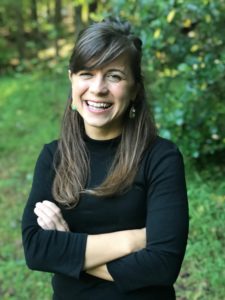Meet Postdoctoral Scholar Grace Noppert

Name: Grace Noppert
Current title: Postdoctoral Scholar
Years affiliated with CPC: 2018 – present
Website: http://gracenoppert.web.unc.edu/
What projects are you currently working on?
My work focuses on understanding social disparities in biological aging and biomarker-measured health, with a particular focus on the role of infections in these processes. I am especially interested in understanding how these relationships operate across the life course. I have several projects going on right now that speak to various aspects of my research goals. In one project, I am investigating associations between educational attainment and cardiometabolic health in young adults. Another project focuses on the associations between both adult and childhood socioeconomic status and immune markers in older adults. Finally, as a trained infectious disease epidemiologist I always try to have at least one project that focuses on more traditional infectious diseases such as tuberculosis (TB). Right now, I am finishing up a project examining social disparities in TB in metropolitan Detroit. And of course, I am always working on generating new ideas and plans for future projects and grants.
What was your background before coming to CPC?
I am from the Midwest originally. I grew up in a small town in Indiana. I moved around quite a bit for college and grad school. Most recently, I lived in Ann Arbor, MI where I was working on my PhD in Epidemiology at the wonderful University of Michigan. I moved to North Carolina to take a post-doc position at Duke University in their Center for the Study of Aging and Human Development in 2016. I came to CPC in the Spring of 2018 as a postdoctoral scholar.
What motivates you to do what you do?
I started my career as a middle and high school science teacher in Baltimore, MD. I had the privilege of teaching this amazing group of students—really remarkable young people. For the first time I saw disparities that I had only ever read about. My students lacked basic opportunities to achieve health and wellness, opportunities such as healthy neighborhood environments and adequate food and housing. They were incredibly resilient in the face of these challenges. As a white woman, I had been largely shielded from seeing the extent to which the privilege of my skin color and the neighborhood I grew up in had determined the opportunities I was afforded. My students were incredibly capable and bright and yet the odds were stacked against them from the start. My short time in the classroom forms the basis for what I study today. I think about my students nearly every day as I am trying to understand the patterns I see in my work. The experiences of my students are the foundation for the questions I ask in my research.
What have been some of your best experiences at CPC?
I have really loved my time at CPC. I think what I love most are the informal conversations that happen in the kitchen, or over coffee, or after a seminar. The relationships built in these small moments have formed the basis for a really wonderful social network that both supports me in doing my work but also challenges me to think about issues differently. I feel really grateful for that. There was a CPC dinner last year after the Udry lecture for post docs and faculty. It was such a lovely experience—I was able to talk faculty members I had never interacted with before.
Do you have any advice for current or future trainees at CPC?
The strength of CPC is the network of interdisciplinary scholars that CPC fosters. Reach out and make connections across field. Take advantage of all the formal and informal opportunities to meet folks—stop by cubicles and offices, strike up a conversation in the kitchen, attend seminars. All of these events are opportunities to engage in the incredible network of scholars that is CPC. I would also look to take on new projects in fields that are not your own. Learn from folks in other disciplines—I think interdisciplinary work is the way science is moving and there is no better place to do such work than CPC.
